The Roots Farm Market Brings a New Approach to the Old General Store
August 21, 2023
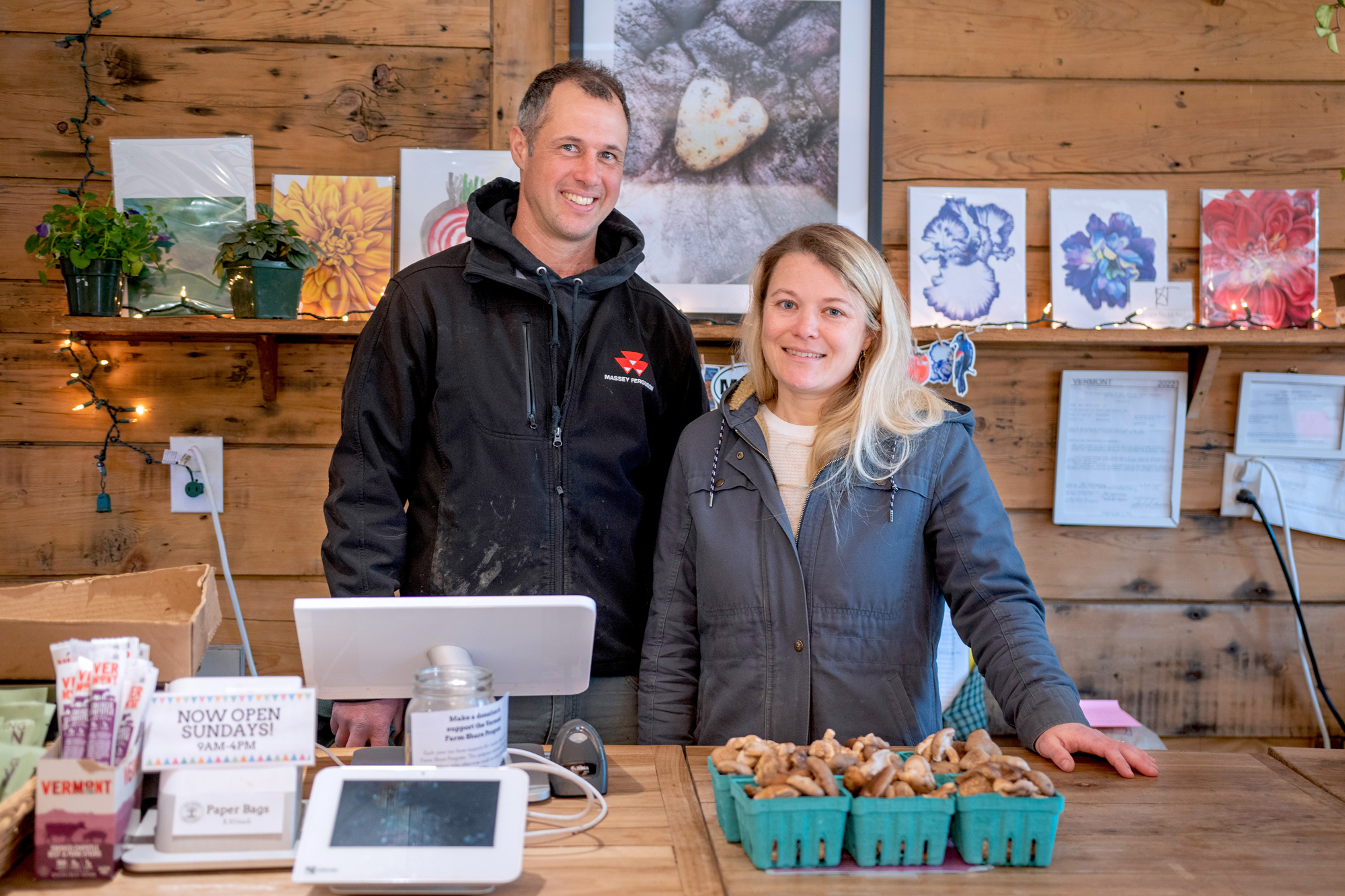
Connection, community, and sustainability at the heart of Karin Bellemare’s vision for a “new, old general store” in Middlesex.
“There’s something larger going on here than bagging greens,” said Karin Bellemare, owner of The Roots Farm Market in Middlesex. “There’s a community connection.”
“We’re in an old-school general store, but new…maybe the new phase of the general store? It may seem kind of ‘new-age’, but there are different ways of doing business that are rooted in kindness and respect for the earth and other human beings. That’s what I’m working to cultivate here.”
From farm to market.
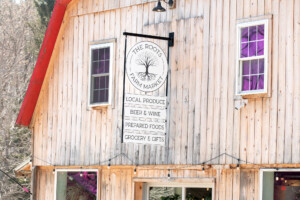
Roots Farm Market, located in a building originally built in the 1850s, had been on the market for three years before owner Karin Bellemare and John Wagner purchased the property and opened the market in 2019. Photo by Erica Houskeeper.
Karin and her husband, Jon Wagner, moved to Vermont in 2013 and started Bear Roots Farm in Barre. For the next five years, they worked the land, selling their produce at Farmers Market’s between Montpelier and Burlington and offering CSA shares. “We loved it but were getting burned out,” said Karin. “We had this vision of getting out of the farmers market circuit and opening a year-round store where we could sell our produce more than once a week.”
They started looking for a location and landed on the former General Store in Middlesex. The property, which was originally built in the 1850s, had been on the market for three years. While the location between Montpelier and Burlington with access to the Valley felt right, it was a big leap. “I was terrified,” admitted Karin, “but Jon is a big idea guy and he saw how it could work.”
While Jon’s vision may have propelled them forward in the early stages, it was Karin’s intuitive understanding of what products to sell, how to set up the store, and the culture she wanted to create that carried their momentum. She and Jon agreed that she would run the store while he continued to manage the farm. Opening in May of 2019, Karin invited other farmer’s market vendors to sell their products, brought in beer and wine, and curated a selection of grocery items to supplement the produce from her farm.
Choosing to stabilize, not skyrocket.

Owner Karin Bellemare responded to the need for people to purchase food locally by offering prepared meals. She created an online store, set up outdoor pickup, hired a new manager, and leveraged the increase in sales to purchase kitchen equipment. Photo by Erica Houskeeper.
Her thoughtful approach was upended ten months later when the pandemic disrupted food systems around the country. Responding to the need for people to purchase food locally, she created an online store, set up outdoor pickup, hired a new manager, and leveraged the increase in sales to purchase kitchen equipment, allowing her to offer prepared meals.
“It was wild times,” she said. “I just kept building, but we didn’t have our bearings; we were not even one year old. A lot of businesses, mine included, had to change everything to accommodate demand for local food during the pandemic. And then there was the aftermath of that.”
“When the chaos ended, we had this choice–do we try to stay at this level even though it feels manic and stressful? Everyone was looking to me for stability but we didn’t have the systems in place. I chose to calm it down. Now the goal is to stabilize; it’s not to skyrocket.”
Toward the end of 2021, Karin contacted the Vermont Sustainable Jobs Fund (VJSF) business coaching program. “I realized the need for systems improvement,” she said. “I wanted solid staff and inventory structures. I needed to understand my books. And I needed to evaluate what growth would look like within those parameters.” She was connected with Jean Kissner as her lead coach. Jean then brought in fellow coaches, Beth Gilpin, Linda Markin, and Victor Morrison to assist with other aspects of the business over the past year.
“It was hard for me,” said Karin. “I kind of dreaded the idea of an employee manual and budgeting spreadsheets, but I had limped along long enough. I didn’t want to limp anymore.”
“She was hesitant to join the program,” said Kissner, “because she’s always overwhelmed with someone quitting or a machine breaking. We helped her design systems to accommodate those things and make space to focus on the business.”
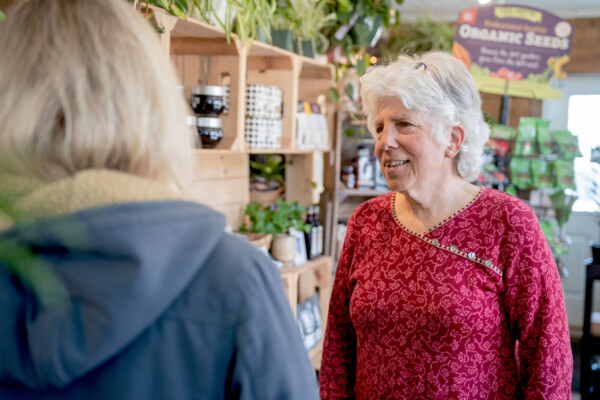
Business coach Jean Kissner advises Karin Bellemare, owner of The Roots Farm Market. Photo by Erica Houskeeper.
Having coaches, says Karin, helped validate that her intuition was on the right track. “They would show me literal evidence that things were working. It was both the feedback and having the systems in place to look at that evidence. It gave me trust in myself to just keep going.”
“They would remind me, ‘this is your business, you know it.’ And I’m like, ‘right, I created this.’ It’s scary but it becomes less scary when you can see clearly what’s going on,” said Karin.
A culture of kindness and respect.
After what Karin calls a “rough patch,” she decided to become intentional about culture. “There was so much change happening and it felt important for us all to be on the same page,” she said. “Everyone here today has a core commitment and care for the store and the community. That’s huge.”
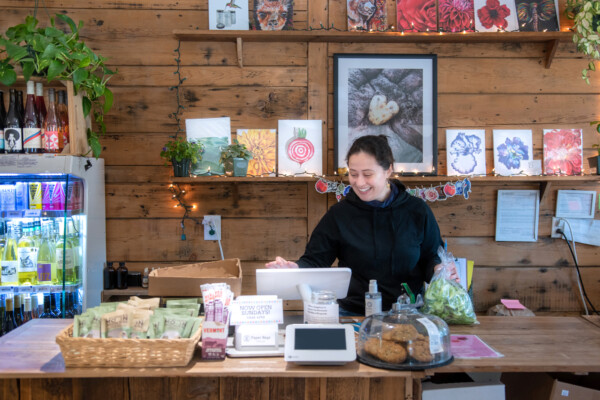
Suzanne Hassanein rings up produce at The Roots Farm Market in Middlesex. Photo by Erica Houskeeper.
Working with Beth Gilpin, Karin has become clear on job descriptions, roles, and responsibilities. A new employee manual, which Beth calls more of a “culture document” outlines Karin’s expectations of staff. She recently shifted two of her long term employees into manager positions, and has created a flexible structure that accommodates employees who have other obligations or priorities, such as family, or another job.
“For me clarity is key, so people know where they stand and how it functions; what each little piece means,” said Karin. “Providing that clarity has been huge. But if we want to really get to the foundation of it all, it’s basic respect for humans and the earth. That’s the way I’m approaching this business on many fronts…people management, food systems, community. Kindness and respect. That’s the lens I put on it.”
Editor’s Note: Roots Farm Market was not damaged by the July 2023 flooding and remains open. Bear Roots Farm, however, was much harder hit. The Northeast Organic Farming Association of Vermont has created the Farmer Emergency Fund to help farms repair storm damage.
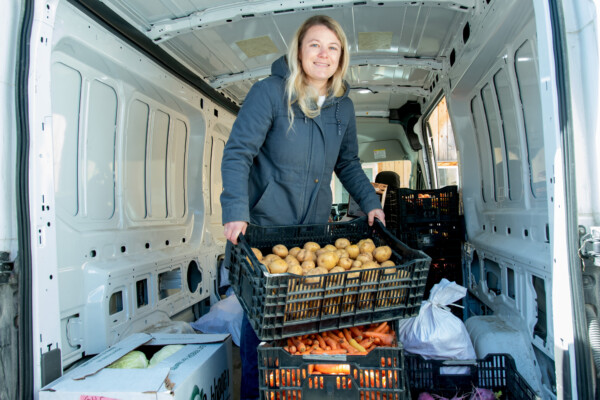
Karin Bellemare unloads a delivery of potatoes at The Roots Farm Market in Middlesex. Photo by Erica Houskeeper.
About VSJF’s Business Management Coaching Program
The Vermont Sustainable Jobs Fund provides tailored, high-touch planning, coaching, and advising for business owners and their management teams to advance profitability, job creation, and sustainable job development. Click for more information about business management coaching. Funding support for our coaching program is provided by client fees, the Vermont Agency of Agriculture, Food and Markets and Vermont Housing & Conservation Board’s Farm & Forest Viability Program.
Read More Stories Like This:
- Babette’s Table: Using Projections to Grow with Intention
- Bobolink Yarns: Scaling Back to Find Success
- Hemp and Cannabis Pioneer, Scott Sparks, Navigates Legalization in Vermont
- Business Sense Training Series for Entrepreneurs and Small Business Owners
- Pioneers of African Cuisine, Global Village Foods Finds Community in Vermont




